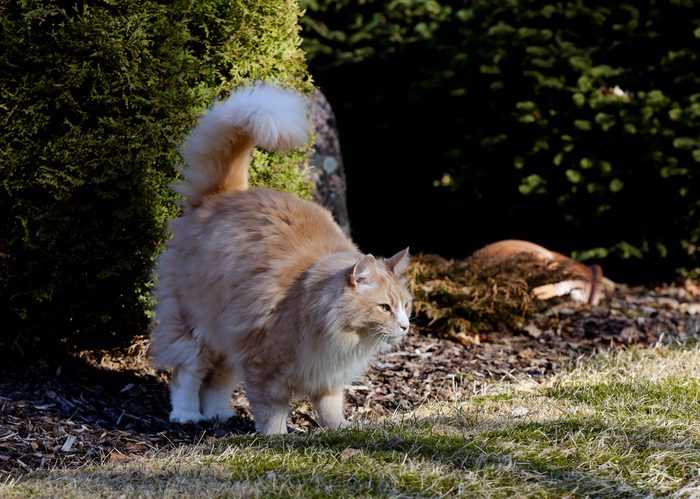If you have never owned a male cat, you might not be aware of the spraying behavior that male felines often display. This can be a very negative behavior in a house cat for obvious reasons, but many owners are not aware of why this kind of behavior is done by cats. Due to the instinctive nature of this action in male cats, it can be very hard to address this problem in house cats.
Spraying is one of a few different ways that male cats lay claim to their territory and protect their own safety. This is a wild cat behavior that can often be circumvented by neutering male cats as young cats, but when you get an older male cat, you might find that this is an issue.
If you want to learn more about the behavior of cat spraying and why cats do it, you need to keep reading!

What is Cat Spraying?
Spraying in cats is urine marking. This behavior is done to tell other cats and animals to stay out of a male cat’s territory in the wild. Cats can defend themselves quite well against many kinds of attacks, but the act of spraying warns off other animals well before a conflict can occur in most cases.
Why Do Cats Spray?
There are many reasons why a cat might spray, here are a few.
Threatened or Stress
Cats that spray might do so when they feel threatened or stressed, but they might also do so to try and warn off other animals from their food or the area where they are burrowed and feel safest. In a house that has more than one cat, spraying can be an issue if your cat thinks that the other animals in the home are threatening their safety.
Attract Female Cats
Cats can also spray to attract female cats for mating. This can be a big issue if you live in an area that has lots of cats that pass by or live nearby, and your male cat can smell them. They might be marking all over your home, trying to draw in these other cats during peak mating season.
Medical Issues
Medical issues can also sometimes cause spraying behavior in male cats, but this is less common. Most male cats spray because they are marking their territory or trying to chase away unwanted visitors to their space. Some cats are much more protective of their space than others, and this behavior might be very frequent when compared with cats that are not as defensive.
New Cat or New Home
If you have a cat that has started displaying marking behavior suddenly, this might be in response to a new cat in the home or a change of residence. This behavior might change over time, but in many cases, cats that start spraying will probably not stop doing so. This can be one of the most disappointing parts of the spraying experience with a cat that is an indoor pet. If you have already neutered your cat, spraying behavior can be almost impossible to control.
How to Identify the Difference Between Spraying and Poor Litterbox Behavior
In some cases, cats can be blamed for spraying when there is actually just a litterbox issue going on in the home. Cats that were fixed as kittens almost never engage in spraying behavior, so you might want to look at the litter box arrangement in your home before you assume this kind of cat is spraying.
When the litterbox is not located in a place that makes your cat feel safe, they might urinate in other places in the house. This can be other rooms, the heating, and cooling vents, or right next to the box but not inside of it. The key factor that you need to use to determine if this is a medical or behavioral issue not related to marking is the actual act that is done at the time of the accident.
When cats spray, they hold their tail up very stiffly, and the tail might quiver or shake. They also stand up very stiffly and do not squat down. Cats that have medical or litter box complaints will usually squat as they normally would urinate. They will just not be taking care of this task in the litterbox as they are supposed to. Cats that are not happy with their litter box situation might also defecate in other areas of the home.
Urine Marking is Natural, But It Might Be a Problem for Indoor Cats
It can be hard to address spraying because urine marking is normal behavior for male cats. When you want to make a cat into an indoor pet, you might need to be open to the possibility that they will not stop marking, even though they live indoors. Some cats that show this behavior at first will learn that they do not need to mark their territory now that they live indoors, but the damage that cat urine can do to surfaces, furniture, and clothing can be significant. Older male cats are better off remaining as outdoor cats due to problems with this behavior.
Plan to neuter your cat before they are old enough to start spraying if you want to avoid this behavior. Fixing your young male cat as soon as it is safe can make sure that your cat does not start displaying this territorial behavior that can damage your home.
To talk with your veterinarian about cat spraying call Northern Pike Veterinary Hospital at 412-373-8580!

